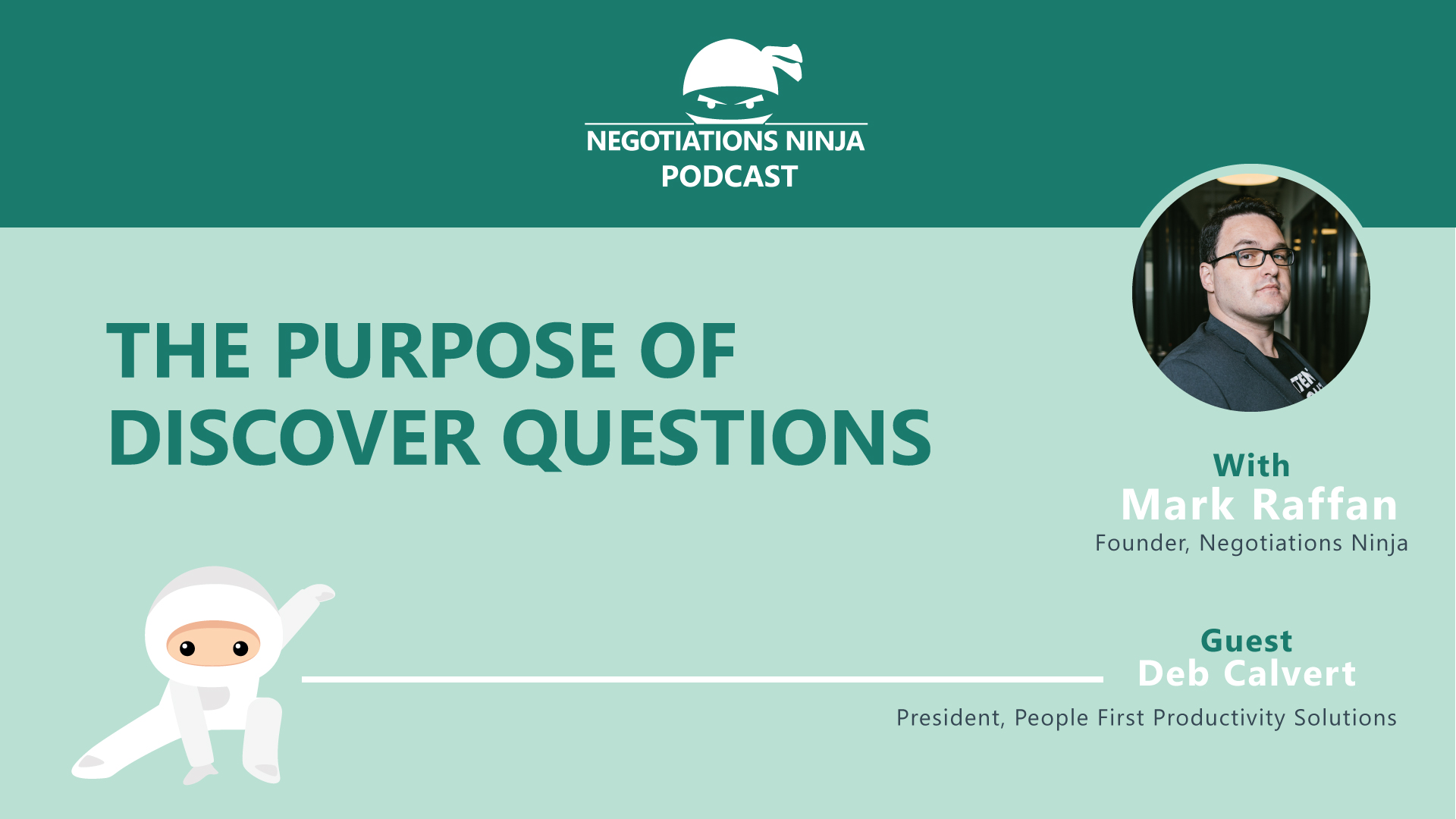In this episode of Negotiations Ninja, we chat with Deb Calvert about the power of DISCOVER questions. We walk through questions related to data, issues, solutions, consequences, outcomes, value, examples, and rationale. If you want to structure your questions properly, Deb is the person to listen to. She shares some valuable insights for negotiators and sales professionals in this episode. Don’t miss it!
Outline of This Episode
- [1:48] Who is Deb Calvert?
- [2:30] What is the DISCOVER Framework?
- [4:34] The DISCOVER Acronym
- [5:59] The importance of the “value” question
- [7:33] Why “Rationale” questions are key
- [10:48] The “Value” question in procurement
- [16:00] A deep-dive into rationale questions
- [20:07] How to manage the budget conversation
- [21:53] How to learn more about DISCOVER questions
What is the DISCOVER Framework?
Deb points out that people hear about the phrase “Discover questions” and think it’s all about the discovery phase of the sales process. But she emphasizes that it is quite applicable to the entire negotiation process.
The framework started when Deb was new in sales. She was looking for any resources she could find to aid her in the process. She ended up getting the book “SPIN Selling,” which she found incredibly helpful. But she realized she was asking questions that didn’t fit the framework. It started a three-decade search for the right questions that would be useful in selling. She began researching at her various positions, with different trainers and coaches, and taking advantage of field research.
Instead of four question types (outlined in the SPIN methodology), she landed on the fact that there are 8 purposes for asking questions. She has been researching, coaching, and interviewing buyers about these 8 types of questions ever since.
So what are the 8 questions? Deb outlines them in the “DISCOVER” acronym:
- D = Data: It’s time to get some facts.
- I = Issue: What’s the issue between the two parties?
- S = Solution: It’s about getting people to think outside the box.
- C = Consequence: Pain-point and goal-oriented questions.
- O = Outcome: Also pain-point and goal-oriented questions.
- V = Value: What is important to the other person?
- E = Example: Time to get thinking and processing.
- R = Rationale: Questions that’s purpose is understanding the buyer’s decision-making process.
Deb shares that the framework is pliable and can be applied to many scenarios.
The importance of the “value” question
In negotiating, Deb recommends that you focus on two types of questions that aren’t used often or well. The first type is value questions, i.e., what is important to the other person. You not only want to find out what is important—but also why it’s important. Then you need to dig deeper and find out if anything else is more important. You always want to remind them of what’s important if you get stuck haggling over price. Deb emphasizes that sellers must be well-versed in using strong-value questions.
Why “Rationale” questions are key
The purpose of a rationale-based question is to understand the decision that has been made and how both parties got there and have gotten you to the point you’re at. What will be the criteria for the ultimate decision? If you can get some of this information and insight beforehand, it’s helpful. These questions also remind them of the key criteria that are important to them in the negotiation process.
Listen to the whole episode for a deep dive into the DISCOVER framework and how both negotiators and sellers can use it to create better outcomes for their negotiations.
Resources & People Mentioned
- The Sales Experts Channel
- Book: SPIN Selling
- Deb’s Book: DISCOVER Questions™ Get You Connected
Connect with Deb Calvert
- People First Productivity Solutions
- Connect on LinkedIn
- Follow on Twitter
Connect With Mark
- Follow Negotiations Ninja on Twitter: @NegotiationPod
- Connect with Mark on LinkedIn
- Follow Negotiations Ninja on LinkedIn
- Connect on Instagram: @NegotiationPod




